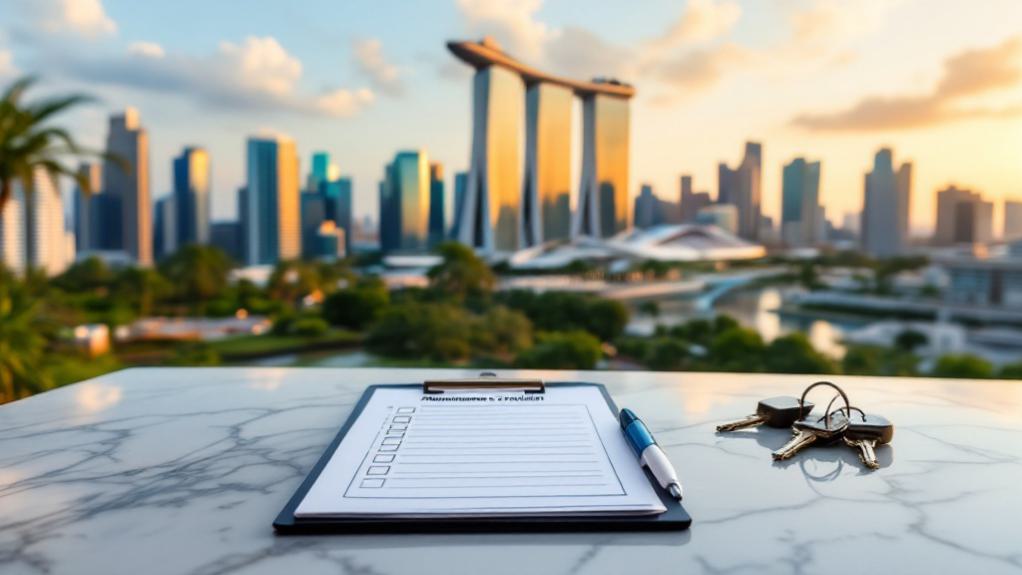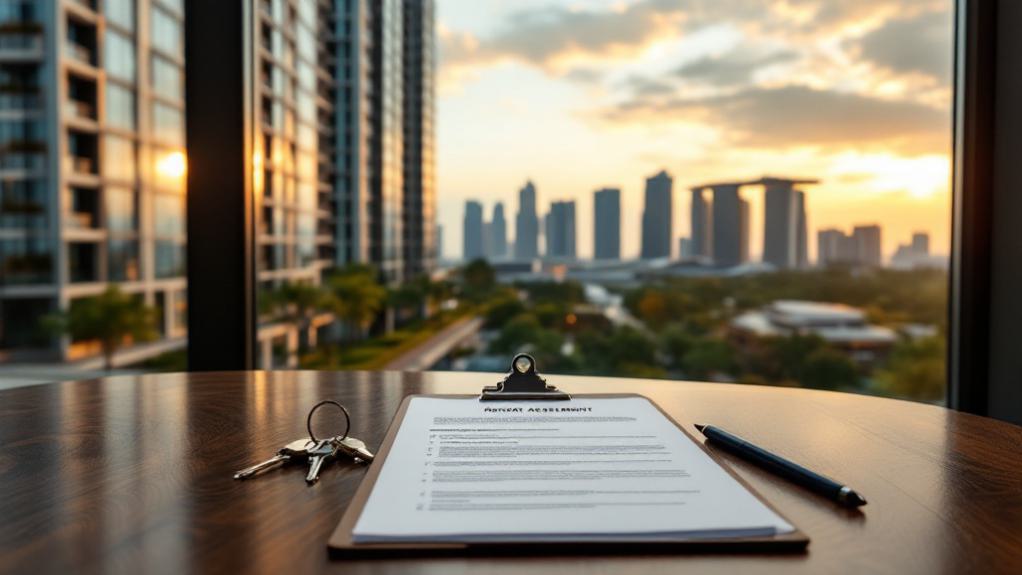Effective property management in Singapore requires landlords to navigate specific regulatory frameworks, including minimum rental periods of 3 months for private properties and 6 months for HDB units, with occupancy limits of 6 unrelated persons per property. Thorough tenant screening, clear maintenance protocols, strategic financial management, and regulatory compliance form the foundation of successful property administration. Proper documentation of tenancy agreements, diligent registration of tenants, and systematic record-keeping of expenses are essential practices that contribute to sustainable rental operations and risk mitigation.

While traversing Singapore’s competitive real estate market presents significant challenges for property owners, effective management practices can substantially improve investment returns and tenant satisfaction rates.
The regulatory framework in Singapore dictates specific parameters for property leasing, including minimum rental periods of three months for private properties and six months for HDB units, with a maximum occupancy limit of six unrelated persons per property. Landlords must fulfill their legal obligations by registering tenants with relevant authorities, guaranteeing tenancy agreements comply with Singapore law, and assuming responsibility for property tax and insurance payments.
Singapore’s rental regulations establish clear boundaries: 3-month minimums for private properties, 6-month for HDB, with strict occupancy limits and landlord obligations.
Thorough tenant screening processes form the foundation of successful property management, encompassing background and credit checks, employment verification, reference consultations, and assessment of financial capacity.
Property maintenance represents another critical dimension of landlord responsibilities, necessitating regular inspections, clear delineation of repair obligations in tenancy agreements, proper upkeep of appliances and systems, and meticulous record-keeping of all maintenance activities. Ensuring the property is in optimal condition before renting through necessary repairs and professional cleaning services can significantly reduce maintenance issues during tenancy.
Financial management requires landlords to establish competitive rental rates based on thorough market analysis, handle security deposits in accordance with regulations, implement efficient rent collection mechanisms, and maintain accurate expense records for tax purposes. Understanding the rules regarding security deposits is essential, as these funds must be properly managed and returned to tenants according to the terms specified in the agreement. Some property owners opt to engage property management companies to oversee these financial aspects, particularly those with multiple properties or limited time resources.
Effective communication with tenants remains paramount, requiring established channels for inquiries and complaints, prompt responses to maintenance requests, proper written notices, and professional tenant relationships. With technological advancements reshaping the real estate sector, landlords can now leverage AI-driven management systems to streamline tenant communication and automate maintenance request processing.
Lease management demands standardized agreements tailored to Singapore’s legal framework, explicitly outlining terms and conditions, conducting thorough inspections, and professionally handling renewals and terminations.
Maintaining compliance with Singapore’s evolving rental laws and regulations constitutes an ongoing obligation for landlords, who must guarantee properties meet safety standards, adhere to fair housing laws, obtain necessary licenses, and maintain appropriate insurance coverage.
These thorough management practices enable property owners to navigate Singapore’s rental landscape efficiently while maximizing returns on their real estate investments.
Frequently Asked Questions
How Do I Handle Late Rental Payments From Tenants?
Landlords addressing late rental payments should implement a structured approach, beginning with preventive measures such as clear payment terms and tenant screening.
When late payments occur, a progressive response framework includes formal reminders at days 1-2 post-due date, followed by written notices with applicable late fees.
For persistent non-payment, legal recourse through Small Claims Tribunals or eviction proceedings becomes necessary, while maintaining thorough documentation of all communication throughout the process.
What Insurance Coverage Do Landlords Need in Singapore?
Landlords in Singapore should maintain landlord insurance, which typically encompasses building coverage, contents protection for furnished properties, and liability insurance against third-party claims.
While not legally mandated (except for HDB fire insurance), extensive coverage safeguards against tenant-related damages, legal expenses from disputes, and rental income loss.
Insurance requirements vary based on property type, location, building age, and security features, with premiums reflecting these risk factors accordingly.
Can I Increase Rent Mid-Lease in Special Circumstances?
Mid-lease rent increases in Singapore are generally prohibited unless explicitly permitted by provisions in the tenancy agreement.
Landlords cannot unilaterally raise rent, even in special circumstances, without the tenant’s consent.
Any increase requires mutual agreement through formal written amendments to the existing lease.
Major property renovations or significant market changes may serve as negotiating points; however, the legal framework governing tenancies prioritizes contractual stability and tenant protection over landlord flexibility.
How Do I Resolve Disputes With Difficult Tenants?
Dispute resolution with difficult tenants necessitates a structured, documented approach, beginning with clear communication wherein all interactions, property conditions, and correspondences are meticulously recorded.
Mediation represents an initial step toward amicable resolution, offering opportunities for compromise prior to pursuing legal recourse.
When diplomatic avenues are exhausted, landlords may escalate to appropriate legal remedies, including Small Claims Tribunals for disputes under $20,000, applications for possession orders, or writs of distress for unpaid rent.
What Tax Deductions Are Available for Property Maintenance Expenses?
Singapore’s tax code permits deductions for property maintenance expenses including repairs to restore original condition, painting, pest control, common area maintenance charges, fire insurance, and third-party property management fees.
Landlords may choose between claiming actual expenses with receipts or opting for a 15% deemed expense deduction of gross rental income, capped at total rental income.
The same method must be applied across all rental properties, with supporting documentation retained for five years.





